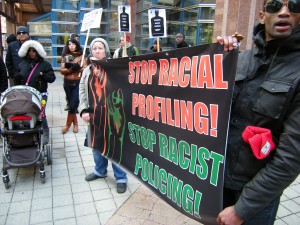by Christopher Williams of the Network for the Elimination of Police Violence

In the 19th century, Frederick Douglass had a firm vision of how social injustice, stemming from unjust exercises of power, should be combatted. Isn’t his standpoint applicable to the 21st century?
Poor Frederick Douglass apparently had it all wrong when he famously stated, “power concedes nothing without a demand. It never did and it never will.” According to a recent National Post opinion piece on contentious police practices in Toronto, sitting down and chatting with power, rather than demanding anything from it, is the key to progress.
Jamil Jivani, in his piece entitled “Not happy with the police? Try talking to them ,” implies that those who “turn to law and policy to improve policing” or who make use of “human rights complaints or class action suits to demand changes to policing” are misguided souls who fail to recognize the value of “mediated conversations” as drivers of police reform. Having disparaged collective struggle in favour of bourgeois hyper-individualism, he recounts how he arranged to have a December 2013 conversation with two Toronto officers who, five weeks earlier, grilled him based on his (supposed) resemblance to a drug-dealer they were (supposedly) targeting. The conversation was enabled by the Office of the Independent Police Review Director (OIPRD) and, all and all, he derived satisfaction from the fact of having an amicable talk with the officers.

Protestors in Toronto affirm their commitments to collective action against oppressive policing.
One of the supreme ironies of Mr. Jivani’s anti-law, anti-policy argument is that his mediated conversation took place under the auspices of a public body that came into existence through law: a 2007 amendment to the Police Services Act (Part V) initiated the 2009 opening of the OIPRD. He is therefore a beneficiary of the same police-related legal processes that he derides. Another irony: the OIPRD affirms the relevance of policy given that they accept complaints about “a policy of a police department,” as the “Complaints” section of their website indicates. Tangentially, he mentions the police killing of Sammy Yatim without considering that the resulting second-degree murder charge was issued by the Special Investigations Unit, founded in response to – god forbid – collective agitation , particularly on the part of the black community and youth.
The propositional foundation of Mr. Jivani’s overall stance is best summed up in his claim that “individual officer discretion largely determines how people will experience policing in their city.” While it is true that the low-visibility nature of policing gives cops a good measure of on-the-street decision making power, police discretion never unfolds in a vacuum. Organizational imperatives, police sub-cultural norms, prevailing public sentiments, asymmetrical power relations (between the police and the policed) and other factors establish the functional parameters within which such discretion is exercised.
No matter how law-abiding they may be, hundreds of thousands of people have been entered into the contact card database over the past several years.
If, for example, we take a look at a Toronto police practice mentioned by Mr. Jivani, namely, contact carding, it is a fact that blacks are more likely to be carded than whites in every patrol zone , it is a fact that officers are pressured by their superiors to engage in carding and it is a fact that when the contact card receipt system was implemented rates of carding plummeted . The old quip about those who never let facts get in the way of a good story applies to anyone who tries to explain carding (and numerous other police practices) with primary reference to individual officer discretion. Attempting to address large-scale violations of the law (the Charter, the Ontario Human Rights Code, etc.) as committed by “law enforcers” requires large-scale activism, not cathartic cop-meets-civilian conversations.
Comments
